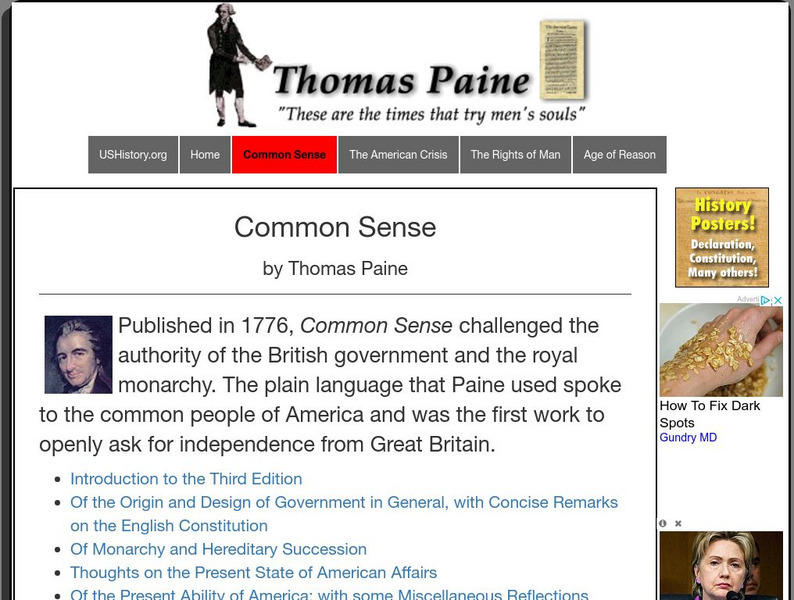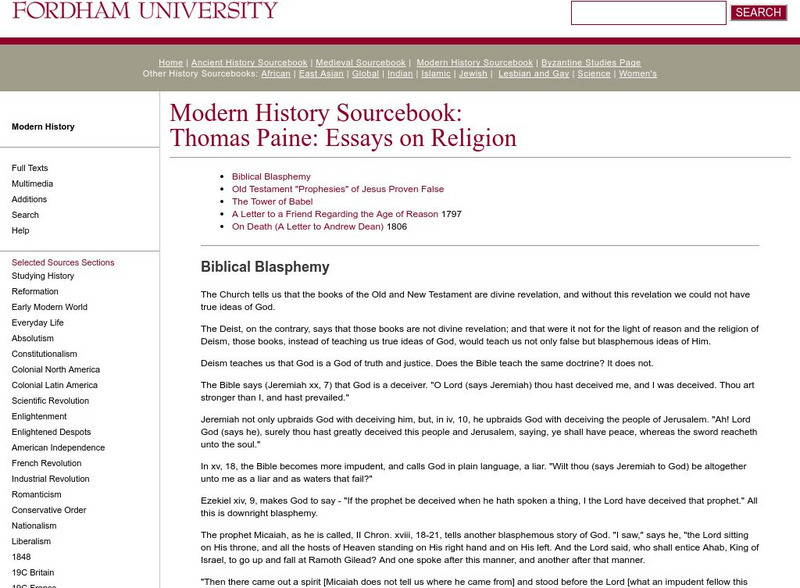Hi, what do you want to do?
PBS
Thomas Paine: Writer and Revolutionary
Is the pen really mightier than the sword? Scholars analyze the impact Thomas Paine's book Common Sense had on the American Revolution. Video clips and primary sources investigate the role Paine had on dissent in the colonies....
National Endowment for the Humanities
Common Sense: The Rhetoric of Popular Democracy
Young scholars identify important arguments for independence made in Thomas Paine's Common Sense. They explain why these arguments helped persuade American colonists that independence was necessary. Students describe the importance of...
Curated OER
The American Crisis, Number 1
Use this presentation about Thomas Paine's The American Crisis series to guide any number of assignments. The slides provide instructions for a literary terms assignment, an open response journal entry, two research writing...
Curated OER
Lesson 2: Using Common Sense
Tenth graders explore the impact of Thomas Paine on the American Revolution. In this colonial America instructional activity, 10th graders analyze Common Sense and then paraphrase selected excerpts of the pamphlet. Students also respond...
Curated OER
The Beginnings of Constitutional Government
Students examine excerpts of Thomas Paine's Common Sense. In this early American history lesson, students read Paine's pamphlet and analyze the information according the rubric provided.
Curated OER
Common Sense Lesson Plan
Students examine excerpts of "Common Sense" and determine how it influenced the times. Using other primary source documents, they identify the amount of political discourse before and during the American Revolution. They answer questions...
Curated OER
The Road to Democracy
Eleventh graders examine the road to the American Revolution. In this American Revolution lesson, 11th graders read Thomas Paine's works and identify the issues that the colonists had with the British government.
Curated OER
Moving Toward Independence
Eighth graders identify the reasons why colonists were fed up enough to want to break free of colonial rule and create their own government. They complete an in-dept analysis of the pamphlet Common Sense and it's role in fueling the...
National Endowment for the Humanities
Lesson 2: Religion and the Argument for American Independence
Young scholars examine how religion affected arguments justifying American independence. They read and analyze primary source documents, and write an essay analyzing how Americans used religious arguments to justify revolution against a...
Curated OER
The Declaration and Beyond
Learners are explained that they are going to use a part of Thomas Paine's 1776 pamplet Common Sense as a starting point for exploring about argumentation, or persuasive writing. They are given a copy of the excerpt. Students discuss...
New York City Department of Education
Colonial America and The American Revolution
How did the founding of the American colonies lead to a revolution? Use the essential question and sample activities to guide learners through a series of history lessons. Additionally, the packet includes effective strategies to...
Curated OER
My Brother Sam is Dead: A study of the Revolutionary War
Fifth graders complete an analysis of the Revolutionary War through literature. After "My Brother Sam Is Dead," students create a time capsule containing items that would be relevant during the Revolutionary War. They identify key...
Curated OER
The Declaration of Independence
In this social studies worksheet, students locate 54 words relating to the Declaration of Independence in a word search. Students may self correct by selecting the link at the bottom of the page.
Curated OER
Road To Revolution
Students examine events that occurred and explore the differing sentiments between the British and American colonists in the years leading up to the American Revolution. They view and discuss a video on the events then analyze quotes...
Independence Hall Association
U.s. History: Common Sense by Thomas Paine
The complete original text of the third edition of Thomas Paine's "Common Sense" published in 1776 in six linked sections.
Internet History Sourcebooks Project
Fordham University: Modern History Sourcebook: Thomas Paine
The complete original text of Thomas Paine's "Common Sense" originally published in January 1776.
PBS
Pbs Learning Media: Thomas Paine: Writer and Revolutionary
By watching a biographical video and engaging in two primary source activities, students will encounter the ideas, writings, and impact of Thomas Paine.
Internet History Sourcebooks Project
Fordham University: Modern History Sourcebook: Thomas Paine
Some of Thomas Paine's essays on religion can be found at this site.






















